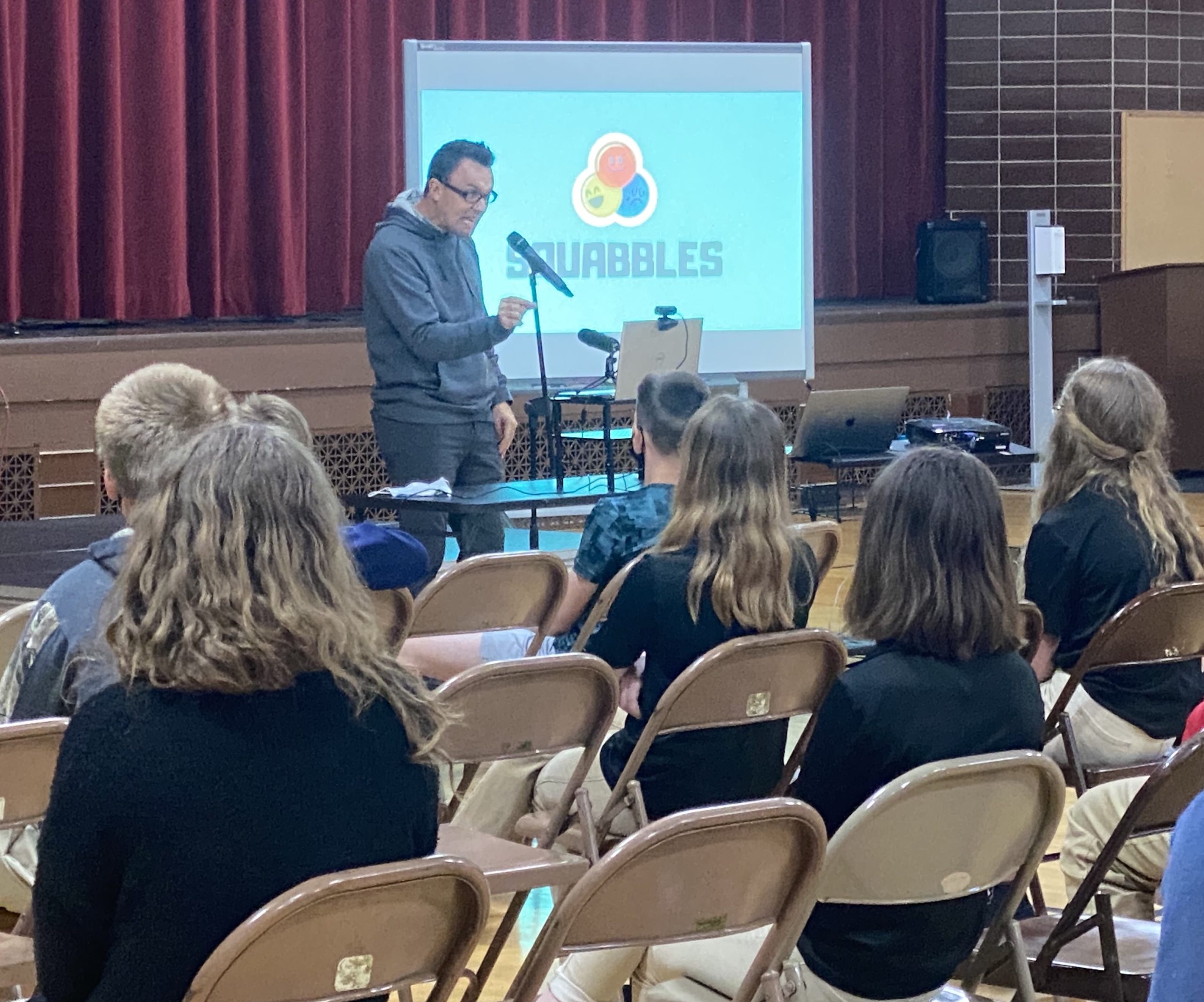
Psychologist and sociologist Dr. Brooks Gibbs speaks to a group of students at St. Joseph Catholic School in Rice Lake on May 7. Gibbs founded “Raise Them Strong” and speaks, educates and writes about raising resilient and kind children. The evening before a free event was offered for parents to learn strategies for navigating childhood challenges. Submitted photo)
Jenny Snarski
Catholic Herald Staff
Nationally recognized youth speaker Dr. Brooks Gibbs gave a series of presentations at St. Joseph Catholic School in Rice Lake May 6-7.
Gibbs is a school psychologist, sociologist and founder of Raise Them Strong, an online educational resource for raising resilient kids.
The first presentation was directed to parents and adults and was livestreamed on the St. Joseph Catholic School Facebook page.
With humor, Scripture and snippets of song, Gibbs equated resilience with patience and love and made a strong case for reframing the “anti-bullying movement” with a social and emotional approach that provides for logical solutions to interpersonal aggression, particularly among school-aged children.
Using a cognitive-behavioral therapy approach, Dr. Gibbs told parents that “thoughts can protect us from emotional pain.”
Repeating three times – “Words can only hurt me if I let them” – and giving context to the somewhat debated axiom that “sticks and stones can break my bones, but words can never hurt me,” the speaker affirmed that thoughts can protect a child, any person, from emotional pain.
“Kids think speech is violence, they really do,” he stated, and then described three elements that form the foundation to all resilience with an ABC acronym.
“A” stands for activating the event, and “C” represents the emotional consequences.
“What we’re failing to do is in between A and C,” Dr. Gibbs highlighted.
“’B’ is the belief system, or interpretation. A is the stimulus, but it is B that determines what C is.”
He declared that being 100 percent in control of one’s own emotions is not only possible, but necessary.
Acknowledging that all parents and educators want a bully-free environment, Gibbs said, “That’s not reality.” Later, he said there is no need for the use of the word “bully.”
“Kids are told to go to someone else to solve their problem,” he pointed out. “We don’t do the reading, writing and ‘rithmatic for them, but we do the relationships for them. No wonder they have become helpless … dependent and entitled.”
Including Gospel references to love and do good for your enemy, Gibbs clarified that “bully” is a subjective term and that the goal, more than focusing on power differentiations, is “to help kids to help themselves, into adulthood.”
He said that when you call things what they are, “everything calms down” and, quoting Fred Rogers, added, “If it’s mentionable, it’s manageable.”
Resilience is practiced, the speaker ascertained, by pointing out facts and asking questions so as not to “give words more power” than they have in and of themselves, not overreacting or exaggerating and accepting truth for what it is.
That said, he made it very clear that it is not acceptable to inflict physical pain or to disrespect someone’s person or privacy.
This acceptance – the ability to be flexible or adjust to a harsh reality – Gibbs said is the basis of mental health.
Maintaining objective demands and boundaries are healthy, but in subjective terms and interpretations, “the more rigid you are, the more breakable and disturbed you will be,” Gibbs said. “What we think about what happens to us is more important and influential than what actually happens.”
Thinking questions are effective tools for children to move from a strong reaction to one of acceptance – How could this have been worse? How will this matter in your future? How could this turn out for your good?
Questioning why someone feels the need to dominate and bother others was also brought up. Gibbs addressed the saying that “dominators are leaders who need education and guidance, feel hurt or victimized.”
Bringing attention back to the Biblical principle of forgiveness in the Our Father, Gibbs led the audience in praying the Lord’s Prayer before taking questions.
A written form of the presentation is available at rethinkbullying.com. More information about Gibbs can be found at raisethemstrong.com.
